#Batrachomyomachia
Text
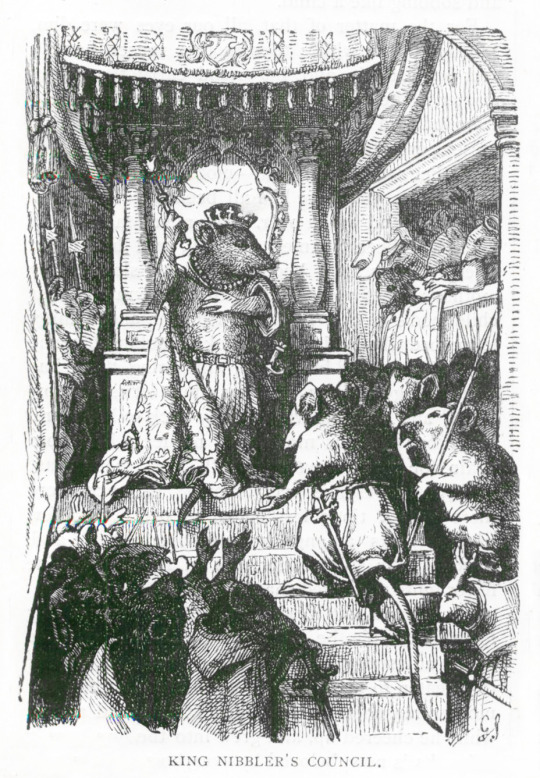
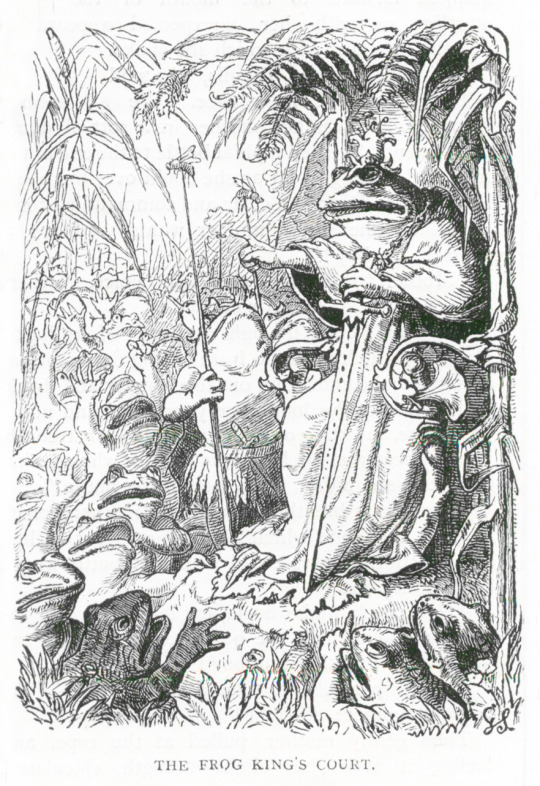
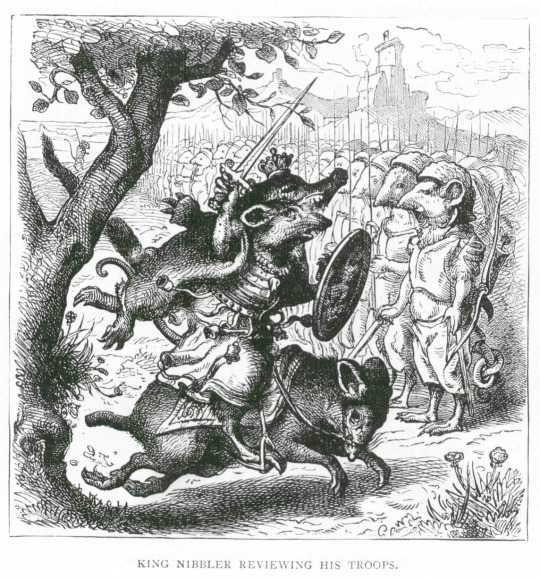
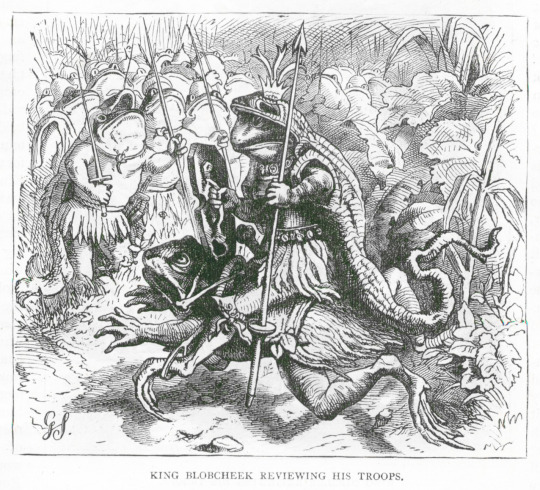
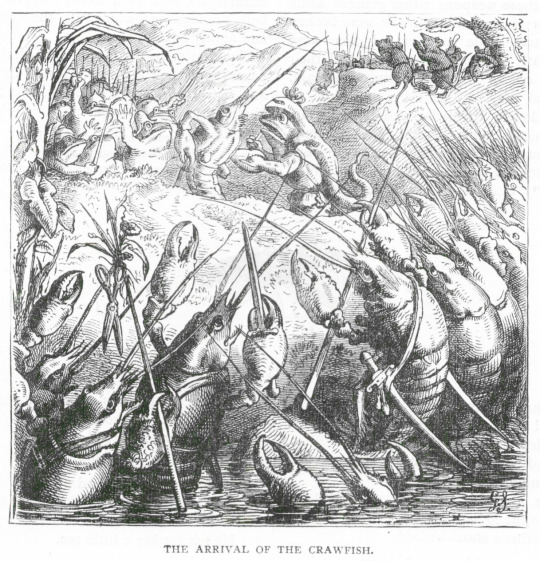
'The Battle of the Frogs and Mice', ''Little Folks Magazine'', 1878
Source
#Little Folks#Little Folks Magazine#homer#Batrachomyomachia#mock epics#frogs#mice#vintage illustration#vintage art
117 notes
·
View notes
Text
E quando i granchi si uniscono alla battaglia tra topi e rane, son cazzi
10 notes
·
View notes
Text
The Batrachomyomachia has truly everything a classic poem has condensed into a few verses
2 notes
·
View notes
Text
Brewer's Dictionary of Phrase and Fable
TODAY'S ENTRY: Batrachomyomachia


8 notes
·
View notes
Text
The Ego of a Mouse: The Poetry of Homer
Note on the text: I used Poems from Greek Antiquity as edited by Paul Quarrie and published by Everyman Library in 2020.
Batrachomyomachia is a really funny short poem that is meant to be a parody of the Homeric epic style. In fact Homer, who wrote The Iliad and the Odyssey, is one of the proposed authors of this text although this has never been irrefutably proven.
In this poem, a frog comes to a watering hole and asks the mouse that he sees there who he is. The mouse answers in a gloriously hubristic, hilariously funny, ridiculously long, monologue that successfully lampoons the “epic” Homeric style. It is also a not so subtle jab at the ego of man- at how we keep assuming that we are the most powerful creatures in the universe despite not even being the most powerful creatures on this planet. Our ability to consistently prop ourselves up, to argue that we are the pinnacle of creation is slightly ridiculous. And for what it’s worth Batrachomyomachia is a Greek word that actually means a trivial altercation:
Known to the gods, the men, the birds that fly/ thro’ wild expanses of the midway sky,/ my name resounds; and if unknown to thee,/ the soul of great Crumbsnatcher lives in me./ Of brave Breadwinner’s line, whose sleeply down/ in love compress’d Lickporridgebowl the Brown./ My mother she and princess of the plains,/ where her father Bacongobbler reigns:/ Born where a Cabin lifts its airy shield,/ with figs and nuts, with vary’d dainties fed./ But since our natures nought in common know,/ from what foundation can a friendship grow?/ These curling waters o’er thy palace roll;/ But Man’s high food supports my princely soul./In vain circled loaves attempt to lie/ conceal’d in flaskets from my curious eye./ In vain the tripe that boasts the whitest hue,/ in vain the gilded bacon shuns my view,/ in vain the cheeses, offspring of the Pale,/ or honey’d cakes to which the gods themselves regale./ And as in arts I shine, in arms I fight,/ mix’d with the bravest and unknown to flight./ Tho’ large to me the human form appear,/ not Man himself can smite my soul with fear./ Sly to the bed with silent steps I go,/attempt his finger or attack his toe,/ and fix indented wounds with dext’rous skill./ Sleeping he feels, and only seems to feel./ Yet we have foes with direful danger cause,/ grim owls with talons arm’d and cats with claws,/ and that false trap, the den of silent Fate,/ where death his ambush plants around the bait;/ all dreaded these, and dreadful o’er the rest/ the potent warriors of the Tabby vest,/ if to the dark we fly, the dark they trace,/ and rend our heroes of the nibling race (30-31).
I love the way that this mouse really does sound like he is one of the Greek heroes of old. The way that he talks about his lineage, the enemies that he has faced, the dangers that he has overcome, you’d think he was Achilles. Hilarious.
5 notes
·
View notes
Text
Did you ever hear the tragedy of the Frog-Mouse War…
Batrachomyomachia, the underrated meme.
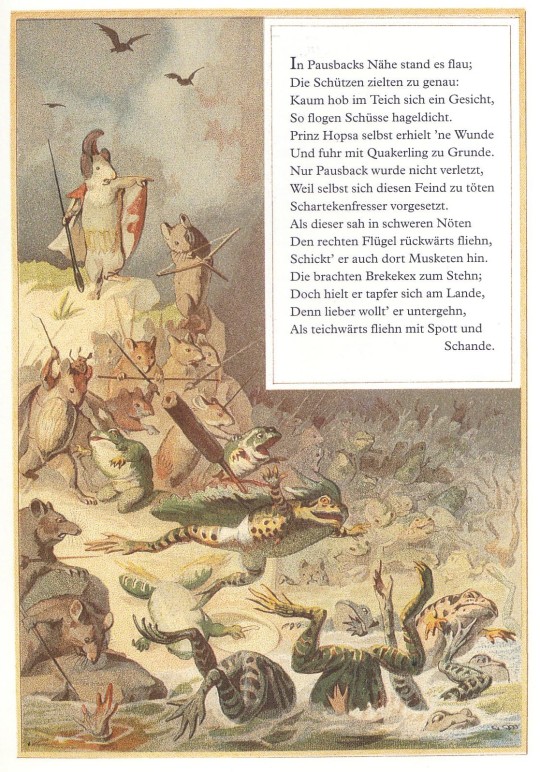
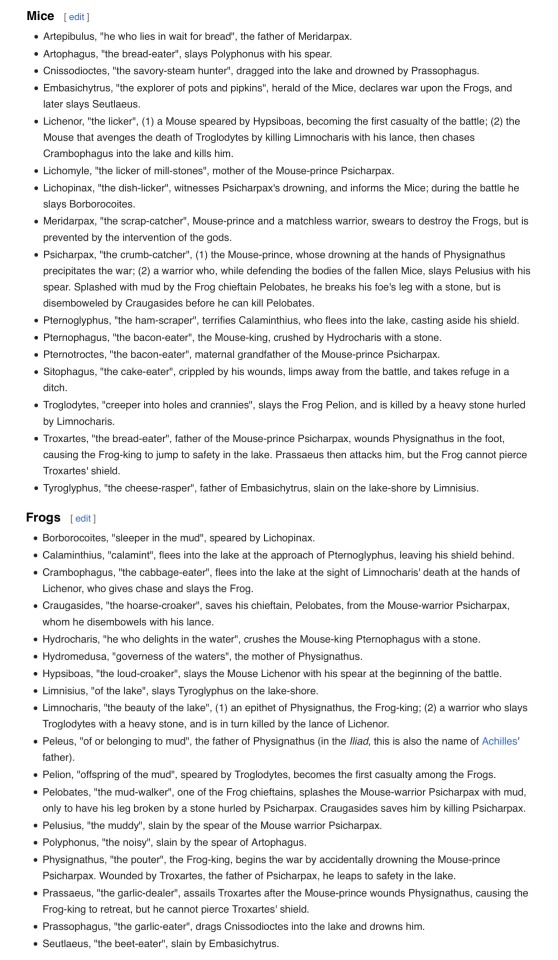
#greek mythology#tagamemnon#batrachomyomachia#frog-mouse war#funny memes#and there’s also a Galeomyomachia#cat-mouse war#who tf came up with it#it’s too fricking hilarious#wait it’s Homer’s???
1 note
·
View note
Text
why would i reread the iliad when i can just read the batrachomyomachia

30 notes
·
View notes
Text
I just encountered a new word.
Batrachomyomachy (BAT-RACK-oh-my-OHM-ma-kee) Noun: -The battle between the frogs and mice; - a Greek parody on the Iliad, of uncertain authorship. - A petty quarrel. From Batrachomyomachia (Ancient Greek βάτραχος, frog, μῦς, mouse, and μάχη, battle), a comic epic parodying the Iliad in which a diving frog accidentally drowns a mouse riding on his back, prompting a war between the species. Used in a sentence: “The bellicose blatherskite believed herself to be a bodacious bellibone, but was, the provocateur of many a batrachomyomachy.”
For some reason, my first thought was of tumblr.
34 notes
·
View notes
Text
WHEN THE FUCK IS OVERLY SARCASTIC PRODUCTIONS GOING TO COVER THE Batrachomyomachia
THE FUCKING FROG AND MOUSE WAR THAT IS A ENTIER ACID TRIP AND A HALF!
#osp#overly sarcastic productions#greek art#greek myths#greek gods#greek myth memes#ancient greek#mice#mouse#frog#please i need this in my life#pleeeeeeeeeaaaaaaaaaasssssssssseeeeeeeeeeeeeeeee
9 notes
·
View notes
Text

🌈13.11.23
let's ignore that I just completely disappeared here 😙
today I:
- booked an appointment with a psychologist because apparently that's self care
- read the batrachomyomachia! it was v fun and the translation was quite good (by Fintan O'Higgins if you're interested)
- learned about Hesiod's Theogony and the Works and Days
- studied some Greek verbs
- realised something huge about autistic trauma?? life = changed
I had a pretty bad weekend but I'm taking the time to do some fun things as well today and ngl I am feeling better
6 notes
·
View notes
Text
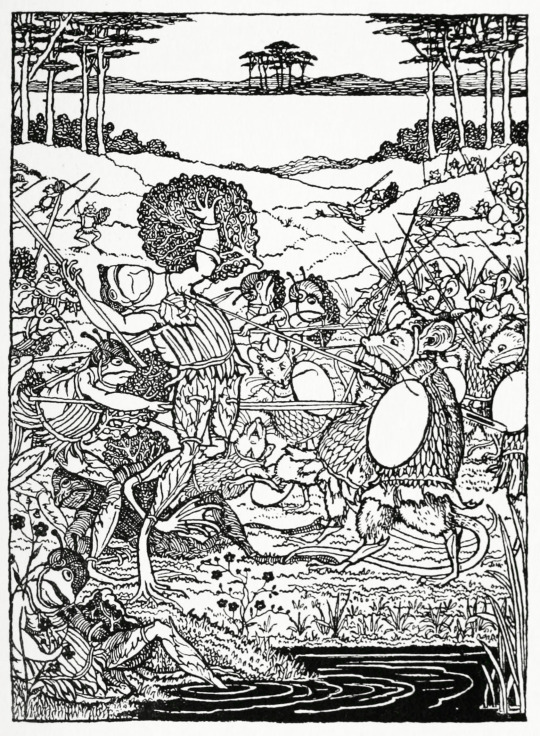
Francis Donkin Bedford (1864-1954), ''The Battle of the Frogs and Mice'', 1894
Source
#Francis Donkin Bedford#british artists#homer#frogs#mice#Batrachomyomachia#mock epics#vintage illustration#vintage art
58 notes
·
View notes
Text
Anyway I'm taking a break.
#from Asimov I mean#technically I should read the Empire series and The end of Eternity but heh#i don't know dudes dudettes and everything in between#I still have two novelettes from october... and the batrachomyomachia...#heh I'll see.#fla speaks#personal
8 notes
·
View notes
Text
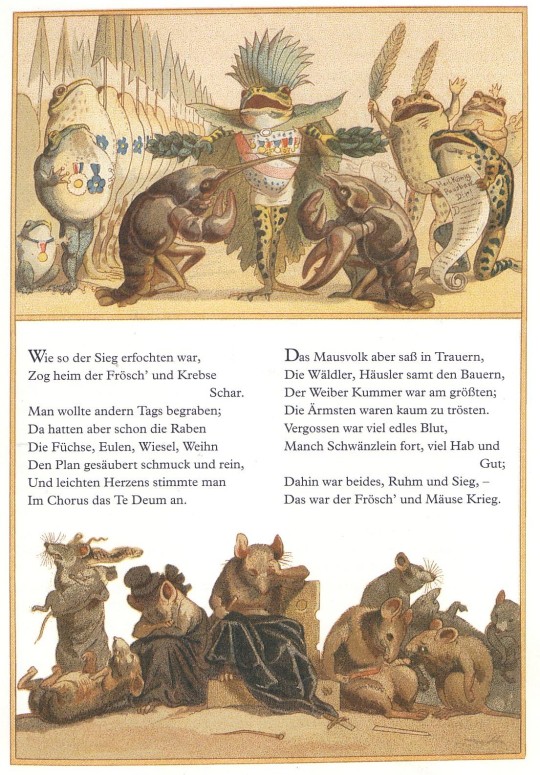
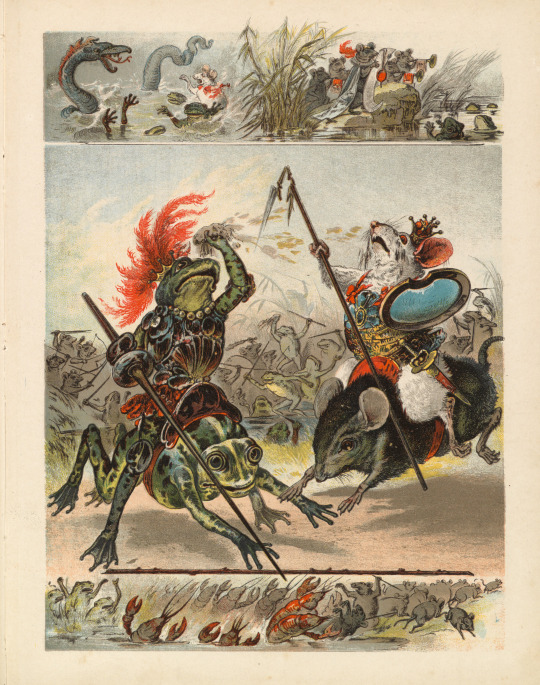
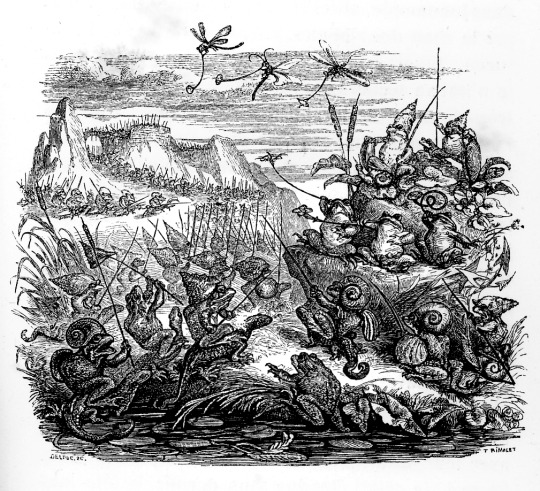
illustrations of the batrachomyomachia
fedor flinzer (top left), carl offterdinger, josef emil dolleschal, or fedor flinzer (top right), louis joseph trimolet (bottom)
3 notes
·
View notes
Text
The Battle of Cats And Mice
In the twelfth century, the classical scholar Theodoros Prodromos wrote the faux- epic Katomyomachia, or The Battle of Cats and Mice. This is a cento, meaning it consists of lines lifted from Homer and the ancient tragedians, cut and pasted to recount an epic battle between the two rival species. Heroic mice satirize the ruling warrior class of the Komnenoi.
From Anthony Kaldellis’ A Cabinet of Byzantine Curiosities

According to Herodotus, Homer, the most respected of the poets entrusted to educate the children of (the Isle of) Chios composed the Batrachomyomachia (Frog-Mouse War), the Epicichlids and other poems full of jokes. In doing so he made the children of Chios, and also those who joined them, useful to the extent that they, who were supposed to acquire their first knowledge, liked to listen to these chants, which were not too demanding even for children's ears. One of the later writers wanted to imitate the poet, so he invented a battle between a cat and mice and made a comedy out of it in iambic meter.
From the Introduction to the First Edition of 1494 by Aristobulus Apostolios (1465-1535)
You can find a translation of it here.
3 notes
·
View notes
Text
My favourite word? Batrachomyomachia. Lok it up, I dare you. Therein be frogs
1 note
·
View note
Text
Correcting Macauley
As we all know, in classical Latin 'c' is pronounced hard, as a modern 'k' - hence "Kaiser" from "Caesar". In the nineteenth century this was no doubt less well known, and I therefore propose that Macaulay, in translating his lay of ancient Rome into English, made an error. I will attempt to correct this by providing an alternate reconstruction, with my amendations indicated by italics:
And now hath every kitty fluffed up her tail, a-men!
The paws are forty thousand, the hisses, thousands ten.
Of course one cannot simply replace 'city' with 'kitty' and call it a day - what is the sense in which a kitty has a "tale of men"? No, no, we must reconstruct the rest of the stanza similarly. A kitty does very clearly have a tail, and once you allow the initial 'kitty/city' error then 'tail/tale' is a very natural further error for Macaulay to make, as is "of men/a-men". Then Macaulay has "the foot are fourscore", and this makes no sense - eighty thousand men (and that's not even counting the cavalry!) is a vast army for the time and place, entirely impractical to feed or coordinate. On the other hand "foot" is of course just another word for "paw", and if we assume ten thousand cats each with one hiss (not horse, pace Macaulay!) then indeed they have forty (not fourscore) thousand paws.
Now, an army of ten thousand kittens is no doubt easier to feed than one of ninety thousand men, some with horses; but it is still a rather absurd image. I therefore propose that the original, now-lost text that Macaulay translated as a heroic epic was actually nothing of the kind, but instead, a parodic, comic text in the style of the Batrachomyomachia - the "Battle of the Frogs and Mice". Alas, the critical approach of correcting plausible errors based on an obvious one does tend to break down the further one gets from the obvious error. Clearly we have Lars Pawsena of Clawsium", but otherwise even the cast of characters is not very easy to correct, much less the action. If Horatius is a cat, he cannot well jump in the Tiber, but this is not obvious - the kitties who fluff up their tails are the allies of Lars Pawsena, and Macaulay's "Romans" may well be some other animal entirely. Indeed this would explain why the Tiber (Tiger?) is so formidable an obstacle.
Still, while this is only a start, it suggests that searching for obscure feline puns in Latin may be a fruitful direction of research, and I would like to urge the grantmaking institutions to take up this fascinating field as soon as practical.
#mostly shitposting#haha pun#fun with language#parody#macaulay#horatius on the bridge#academese verging on humour
1 note
·
View note